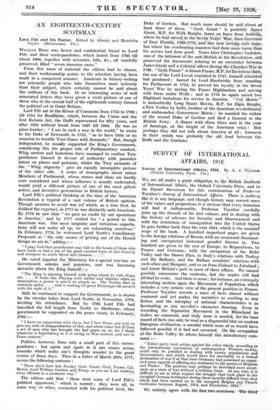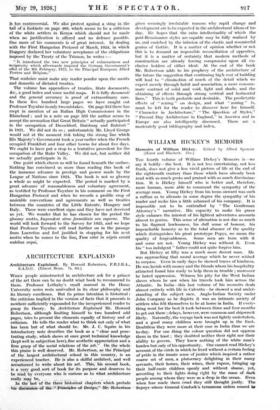SURVEY OF INTERNATIONAL AFFAIRS; - 19241 Survey of International Affairs, 1924.
By A. J. Toynbee. (Oxford University Press. 25s.)
WE are all under a great obligation to the :British titute
of International Affairs, the Oxford University Press, and to Sir Daniel Stevenson for this continuation of Professor Toynbee's Survey of International Affairs. There is nothing like it in any language, and though history may correct some of the values and proportions it is obvious that every historian will fmd it indispensable. Professor Toynbee carefully joins up the threads of his first volume, and in dealing with the history of schemes for Security and Disarmament and with the restriction of immigration into the United States he goes further back than the year 1924, which is the nominal Scope of the book. A hundred important pages are given to the foreign relations of Russia, with an occasional illuminat- ing and unexpected historical parallel thrown in. Two Hundred are given to the rest of Europe, to Reparations, to Trance and Germany, with the occupation of the Ruhr Valley and the Dawes Plan, to Italy's relations with Turkey and the Balkans, and the Balkan countries' relations with each other and Hungary, and so on from Finland to Jubaland ; and Great Britain's part in most of these affairs. We cannot possibly summarize the contents, but the reader will find all that he seeks. And there is more ; for instance, an extremely interesting section upon the Movement of Population, which includes a very serious view of the present position in France. Professor Toynbee records a mass of facts almost without comment and yet makes the narrative as exciting as any Action, and the interplay of national characteristics is as fascinating as any novelist's character drawing. Even in recording the Separatist Movement in the Rhineland he makes no comment, and truly none is needed, for the bare record of facts can only be read as a disgraceful blot on modern European civilization, a scandal which none of us would have believed possible if it had not occurred. On the occupation Of the Ruhr Valley he allows himself this introductory com- ment " Either party took action against the other which, according to the international convention of contemporary Western society, could only be justified in dealing with enemy populations and Governments, and which would have led inevitably to a formal declaration of war if at that time Germany had possessed an organ- ized army capable of offering any resistance to,the armies of Belgium and France. The position may perhaps be described most accur- ately as a state of war without a military front. At any rate, it is difficult to see in what respect the struggle that took place in the occupied German territories during these months differed -from that which had been carried on in the occupied Belgian and French territories between August, 1914, and November, 1918."
We entirely-.agree with -the first two-sentences: The third• la too controversial. We also -protest against i sting in. the tail of a footnote on page 469; which seenis to be a criticism of the white settlers, in Kenya:which Affoukt not be made when no justification is, offered and no defence possible. One more of his comments is of great interest, In dealing with the -First Htuvarian Protocol of March, 1924; in which Humry.declared her voluntary acceptance of the obligations imposed by the Treaty of the Trianon, he writes :— " it introduced the two lneiv principles of voluntariness and reciprocity which afterwards -inspired the German Government's offer of the 9th February, 1945, to the Principal European Allied POWers and Belgium."
That sentence' must make any reader Ponder upon the merits and demerits of dictated treaties.
The volume has appendices of treaties, State documents, are:,.a good index and some useful maps. It is fully documents and the general accuracy is prOof of extraordinary care. In these five hundred large pages we hive caught out Professor Toynbee in only two mistakes. On .page 312 there has crept _ in mention of an Italian High Commissioner in the Rhineland ; and in a note on page 335 the author seems to accept the accusation that Great Britain " actually participated in the occupation of Dusseldorf, Duisburg and Ruhrort " in 1921. We did not do so ; ,unfortunately Mr. Lloyd George would not at the moment risk taking the strong line which His Majesty's Government took a year earlier when the French occupied Frankfort and four other towns for about five days. We ought to have put a stop to a tentative precedent for the occupation of the Ruhr Valley. We did not, but neither did we actually participate in it.
One pOint which cheers us will be found beneath the surface. Nothing has convinced us more than reading this book of the immense advance in prestige and power made by the League of Nations since 1924. The book is not so gloomy a whole as might be expected. The • period is marked by 'a great advance of reasonableness and voluntary agreement, as testified by Professor Toynbee in his comment on the First Hungarian Protocol and when he records a prolific crop of amicable conventions and agreements as well as treaties between the countries of the Little Entente, Hungary and Italy. These were excellent signs and they have not deceived us yet. We wonder that he has chosen for the period the gloomy motto, Impendent (arm formidinis ora superne. The world will look forward to the Survey for 1925, and we hope that Professor Toynbee will read further on in the passage from Lucretius and feel justified in stopping for his next motto when he comes to the line, Tum color in nigris existit nubibus arqui,











































 Previous page
Previous page